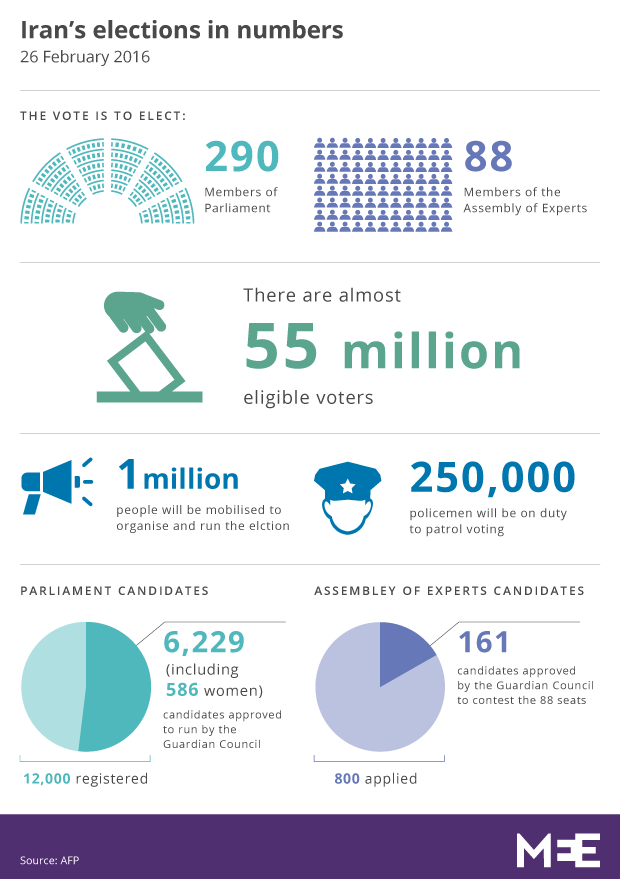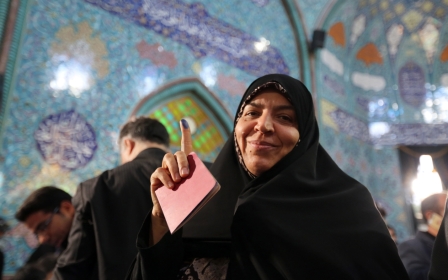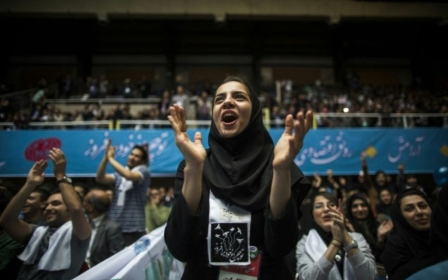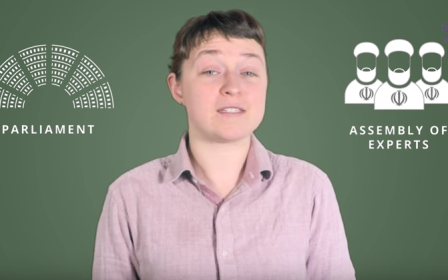Early results in Iran election hint at success for moderates

Around 60 percent of 55 milllion eligible voters cast ballots in Iran's elections on Friday after polling stations were kept open to allow millions of latecomers to participate, Tehran's interior ministry said on Saturday.
Officials said round 25 percent of the votes had been counted by Saturday morning, with moderates looking like the main winners according to the semi-official Fars news agency.
Coming just a month after sanctions were lifted under Iran's nuclear deal with world powers, the outcome of Friday's vote is being seen as a de facto referendum on President Hassan Rouhani's government.
A relative political moderate, Rouhani is hoping an alliance with reformists can eliminate or at least curtail conservative dominance of parliament, giving him a chance of passing promised social and political reforms.
Rouhani also ran himself in the poll for the Assembly of Experts, a powerful clerical body that appoints the country's supreme leader.
Rouhani and key ally Akbar Hashemi Rafsanjani - a former president of Iran - were the frontrunners on Saturday, with the pair attracting the most votes from the capital.
Voters in Tehran will elect 16 members of the 88-member body, choosing from 28 candidates.
After a third of the ballot papers from the capital were counted on Saturday, Rafsanjani was in first place with 692,000 votes, while Rouhani was just behind with 652,000.
At least 33 million voters took part in the polls, interior ministry spokesperson Hossein-Ali Amiri told state television, saying that these numbers will increase as more votes are counted.
A second round will be organised in a number of cities for seats where no candidate received more than 25 percent of votes, he said, without providing further details.
No one electoral bloc is likely to win an outright majority in parliament, but the semi-official Fars and Mehr news agencies reported on Saturday morning that moderate candidates were on course to increase their power at the expense of so-called "principlists," conservative politicians known for their support for a hardline interpretation of the principles of the 1979 Islamic Revolution.
WATCH: Your guide to the Iranian elections in 90 seconds
Definitive results must be confirmed by the conservative-dominated Guardian Council - the unelected body charged with monitoring the vote - and are not expected for several days.
Parliamentarians are elected for four years, but the Assembly of Experts has an eight-year term. Should Supreme Leader Sayyed Ali Hosseini Khamenei, who is 76 and in ill health, die during that time its members would choose his replacement.
The first results are expected to come from the provinces, while the vote tally in the capital, which has a population of 12 million and was electing 30 parliamentarians, will take around three days.
Khamenei is the Islamic republic's ultimate authority and was among the first to vote. He urged the country's electorate to follow suit, saying: "it's both a duty and a right."
Participation in parliamentary elections four years ago was 64 percent nationwide but only 48 percent in Tehran.
Candidates barred pre-poll
A higher turnout would help Rouhani and his reformist allies, after many moderate voters stayed away in 2012 in protest at the re-election three years earlier of hardline president Mahmoud Ahmadinejad.
Known as the "diplomat sheikh" because of his clerical credentials and willingness to negotiate, Rouhani was the driving force behind the nuclear deal, which he delivered despite political pressure at home.
The agreement with powers led by the United States, the Islamic republic's bete noire, raised hopes of economic recovery in Iran. But although the economy exited a deep recession in 2014-2015, growth has stagnated in the past year, and both inflation and unemployment remain high.
A pro-government coalition of moderate and reformist candidates called "The List of Hope" is representing the president's ambitions in the polls.
If voters support the pro-Rouhani ticket, the president could swing the balance of power among MPs and potentially pass economic, social and political legislation that has so far been blocked by a conservative-dominated parliament.
The run-up to polling day was largely overshadowed by controversies over who was allowed to stand. Thousands of candidates were excluded by the Guardian Council.
Reformists said they were worst hit, with the barring of their most prominent faces leaving them with untested hopefuls.
A total of 4,844 candidates, about 10 percent of whom are women, stood in the parliamentary election. Only 159 clerics - a fifth of the applicants - were vying for the Assembly of Experts.
All 16 women who applied to run for the Assembly of Experts were disqualified by the Guardian Council in the run-up to the poll.
New MEE newsletter: Jerusalem Dispatch
Sign up to get the latest insights and analysis on Israel-Palestine, alongside Turkey Unpacked and other MEE newsletters
Middle East Eye delivers independent and unrivalled coverage and analysis of the Middle East, North Africa and beyond. To learn more about republishing this content and the associated fees, please fill out this form. More about MEE can be found here.





